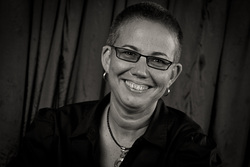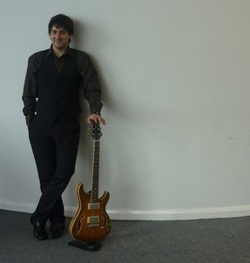Crew
Sophie Meyer

Sophie was born in France and lives in London where she has
worked for the past 13 years as a freelance producer, picture editor and
presenter with Reuters, AP, Rai News, BBC News 24, TF1, France 2, Arte. She is
currently pursuing an MA in Art and Media practice at Westminster University in
London.
Her love and passion for Trinidad & Tobago drove her to research and develop stories on hidden or forgotten traditions. Mystic Fighters is her most recent film and the beginning of a series on martial arts in the West Indies.
She co-produced, wrote and directed ‘Salt of the Earth’, (GB/Trinidad and Tobago 2004), a 52-minute documentary on the Parang music tradition.
She has produced, shot and directed short films for the Arts Council of England and ADAD on Black Dance in the UK. In May 2002, she was film production assistant on the feature “Dangerous Liaison” (Scotland/France/Canada 2002) directed by Jose Dayan. She also has credits as sound recordist and second camera on Lisa Gornick’s, Do I Love You? (GB/Channel 4, 2002), Tick Tock Lullaby (GB, 2007), as second camera on Inge ‘Campbell’ Blackman’s “Paradise Lost” (GB/Trinidad and Tobago 2003) and sound engineer on BBC “Human Planet” (Mali) in 2009.
More recently she was hired by Trinidad & Tobago Film Company to mentor young filmmakers.
Her love and passion for Trinidad & Tobago drove her to research and develop stories on hidden or forgotten traditions. Mystic Fighters is her most recent film and the beginning of a series on martial arts in the West Indies.
She co-produced, wrote and directed ‘Salt of the Earth’, (GB/Trinidad and Tobago 2004), a 52-minute documentary on the Parang music tradition.
She has produced, shot and directed short films for the Arts Council of England and ADAD on Black Dance in the UK. In May 2002, she was film production assistant on the feature “Dangerous Liaison” (Scotland/France/Canada 2002) directed by Jose Dayan. She also has credits as sound recordist and second camera on Lisa Gornick’s, Do I Love You? (GB/Channel 4, 2002), Tick Tock Lullaby (GB, 2007), as second camera on Inge ‘Campbell’ Blackman’s “Paradise Lost” (GB/Trinidad and Tobago 2003) and sound engineer on BBC “Human Planet” (Mali) in 2009.
More recently she was hired by Trinidad & Tobago Film Company to mentor young filmmakers.
Maria Nunes

Maria is a photographer in Trinidad and Tobago with a special interest in capturing imagery related to performance in the arts and in documenting traditional Carnival portrayals such as Moko Jumbies, Stickfighting and Blue Devil Mas.
Among her recent work has been highlighting Keylemanjahro, Trindad's most renowned Moko Jumbies and a commission by the National Parang Association to document the entire Parang season of 2010, then she was Photographer-in-Residence at the Makeda Thomas Roots and Wings Movement Summer Dance Institute in July, 2011.
She has been documenting ongoing projects of the Ibis Ensemble in residence at UTT in Port of Spain which included filming the documentary short "Rainforest: A Musical Postcard from Trinidad" which was recently screened at the Trinidad and Tobago Film Festival. Her interest in the arts has been significantly influenced by her love of music which includes a special interest in collecting early calypso, string band and big band recordings of Trinidad and Tobago, as well as traditional folk and stickfighting songs.
Among her recent work has been highlighting Keylemanjahro, Trindad's most renowned Moko Jumbies and a commission by the National Parang Association to document the entire Parang season of 2010, then she was Photographer-in-Residence at the Makeda Thomas Roots and Wings Movement Summer Dance Institute in July, 2011.
She has been documenting ongoing projects of the Ibis Ensemble in residence at UTT in Port of Spain which included filming the documentary short "Rainforest: A Musical Postcard from Trinidad" which was recently screened at the Trinidad and Tobago Film Festival. Her interest in the arts has been significantly influenced by her love of music which includes a special interest in collecting early calypso, string band and big band recordings of Trinidad and Tobago, as well as traditional folk and stickfighting songs.
Neigeme Glasgow-Maeda

Neigeme is a filmmaker/photographer living in London. He produce his first documentary entitled "Creole" in 2001 in Trinidad & Tobago where he was born. He then lectured in Caribbean Civilisation and Caribbean Literature at the Université des Antilles et de la Guyane which took him to Ethiopia in 2003 where he lectured at the University of Addis Ababa and traveled the country extensively to produce his first photo documentary called "Ethiopia in Colour".
He produced 4 more exhibitions, "the Boxer", "Arret Antillais", "Still Life", and "Blur" presented throughout the Caribbean and continental Europe. Since 2004, Neigeme has produced, directed and won a London fringe Report Award for the best comedy short film in 2008 for "Enter the Preacher".
He is director of the " Caribbean Film Corner" the first Caribbean film festival in Britain dedicated to West Indian filmmakers, their films and the development of the Caribbean film industry.
He produced 4 more exhibitions, "the Boxer", "Arret Antillais", "Still Life", and "Blur" presented throughout the Caribbean and continental Europe. Since 2004, Neigeme has produced, directed and won a London fringe Report Award for the best comedy short film in 2008 for "Enter the Preacher".
He is director of the " Caribbean Film Corner" the first Caribbean film festival in Britain dedicated to West Indian filmmakers, their films and the development of the Caribbean film industry.
Simon Gumbleton

Simon Gumbleton is a london based engineer, mixer, sound designer, editor and composer.
Currently completing a masters degree in audio production at the University of Westminster, Simon has worked on projects as diverse as band recording, radio drama, film sound design and editing as well as animation and video games.
Simon enjoys experimenting with surround sound and is presently exploring the amazing possibilities of interactive and adaptive audio in games.